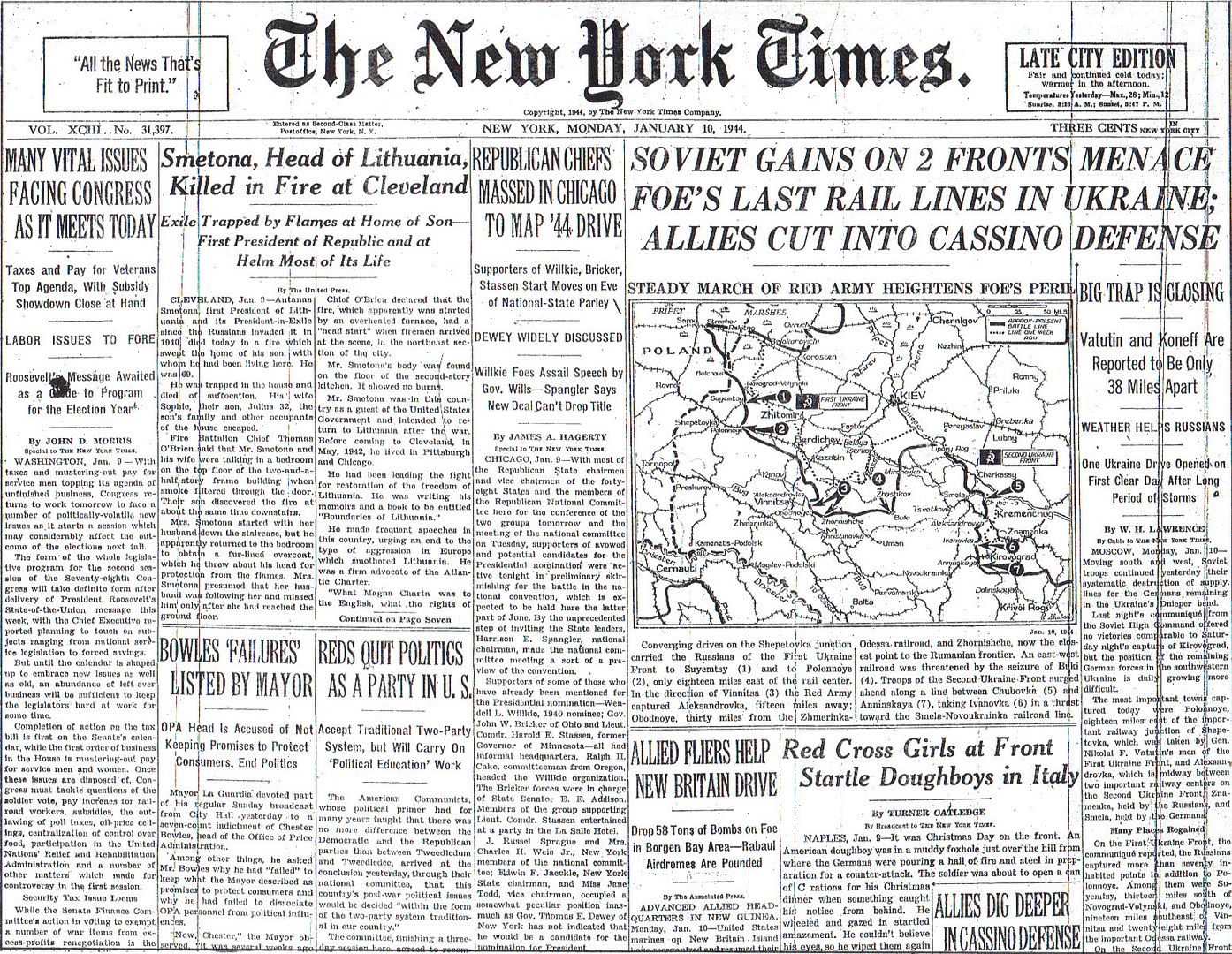
Posted on 01/10/2014 4:17:55 AM PST by Homer_J_Simpson

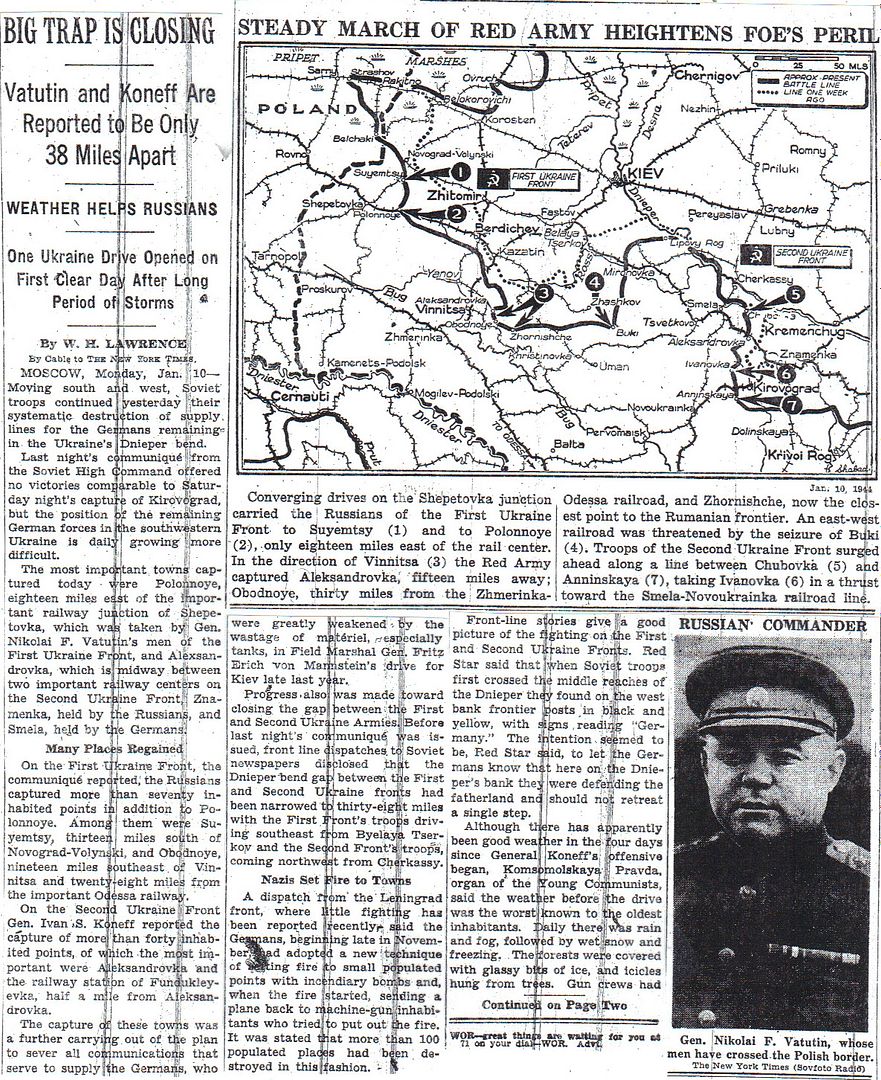
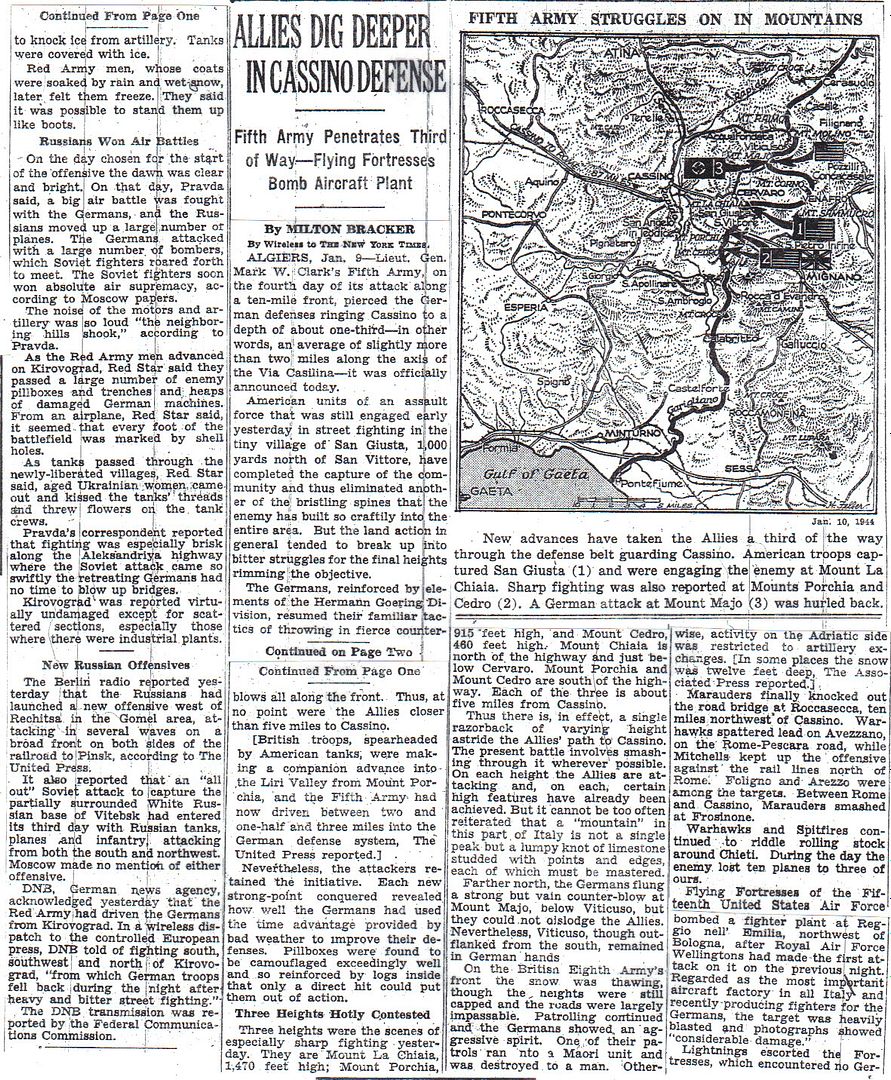
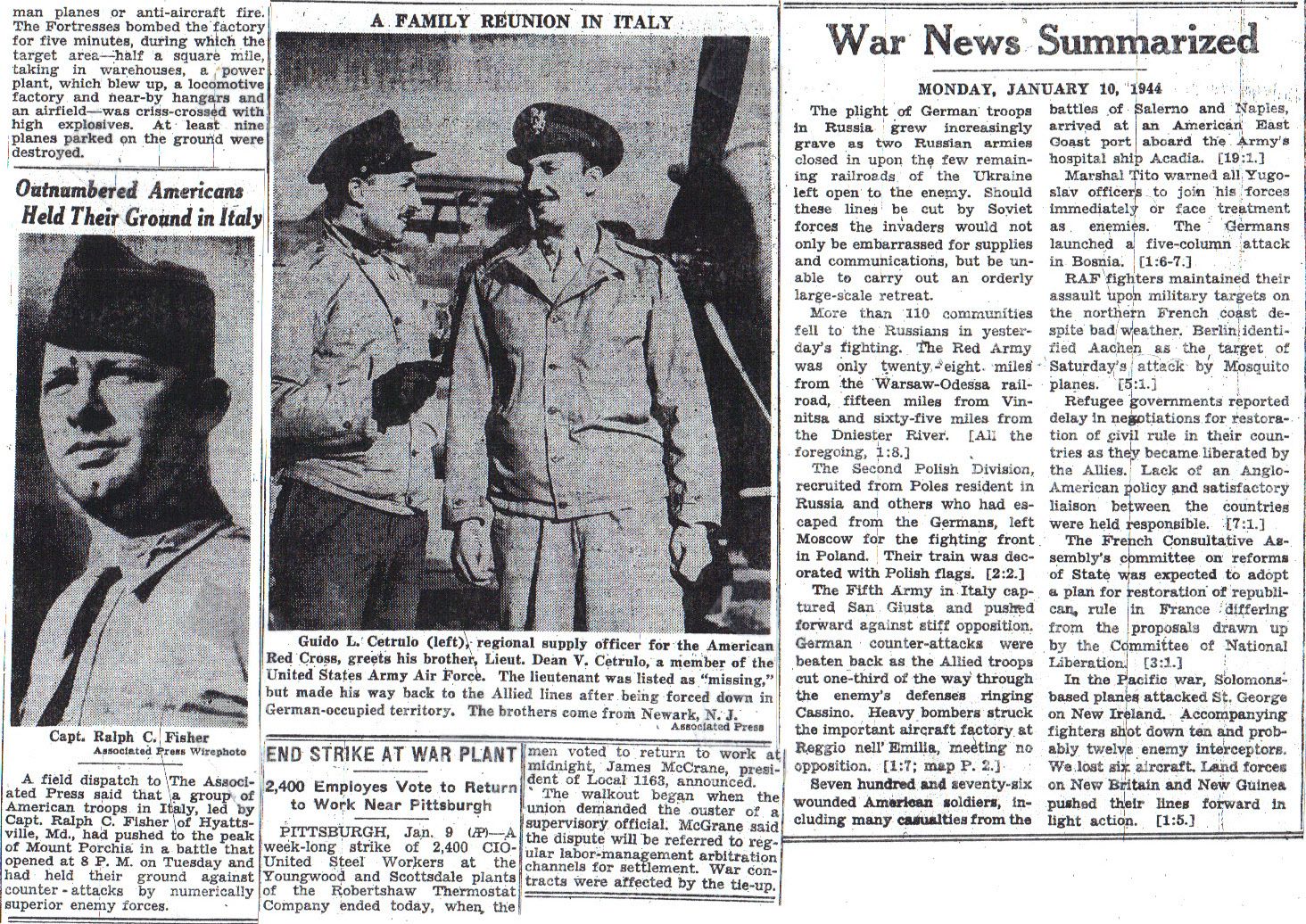
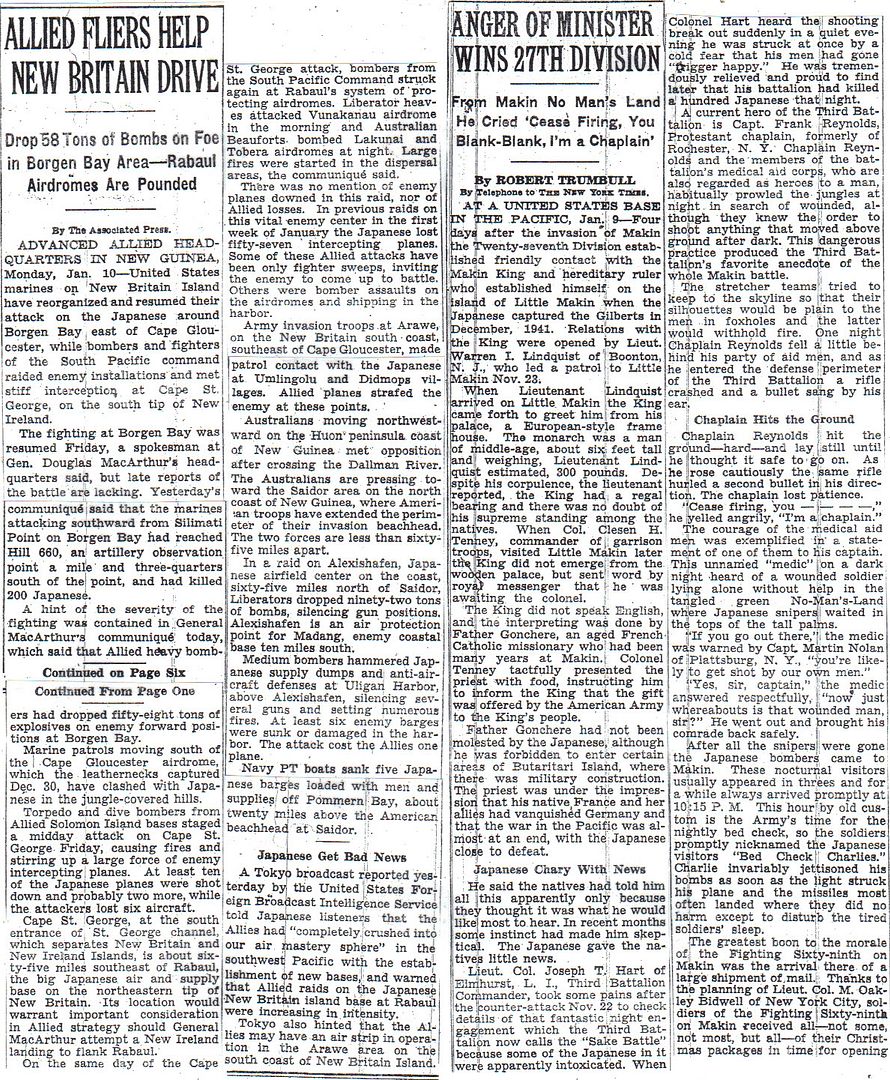
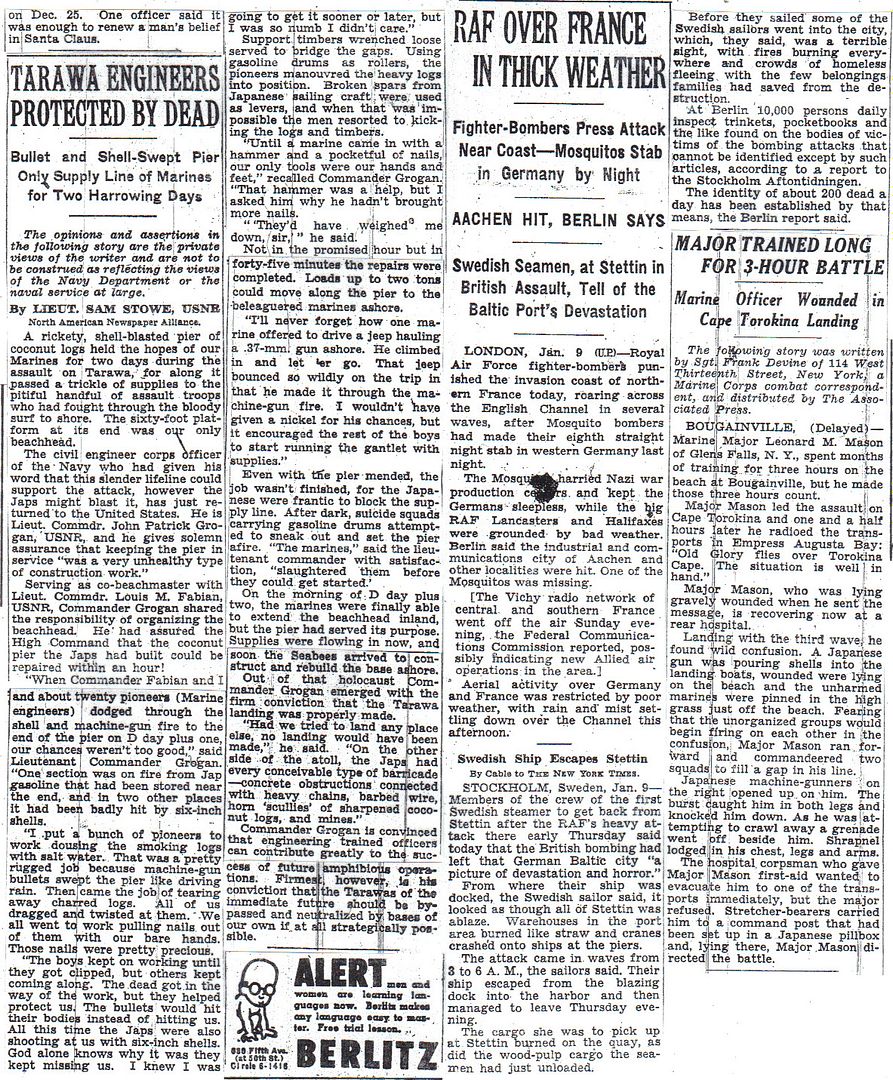
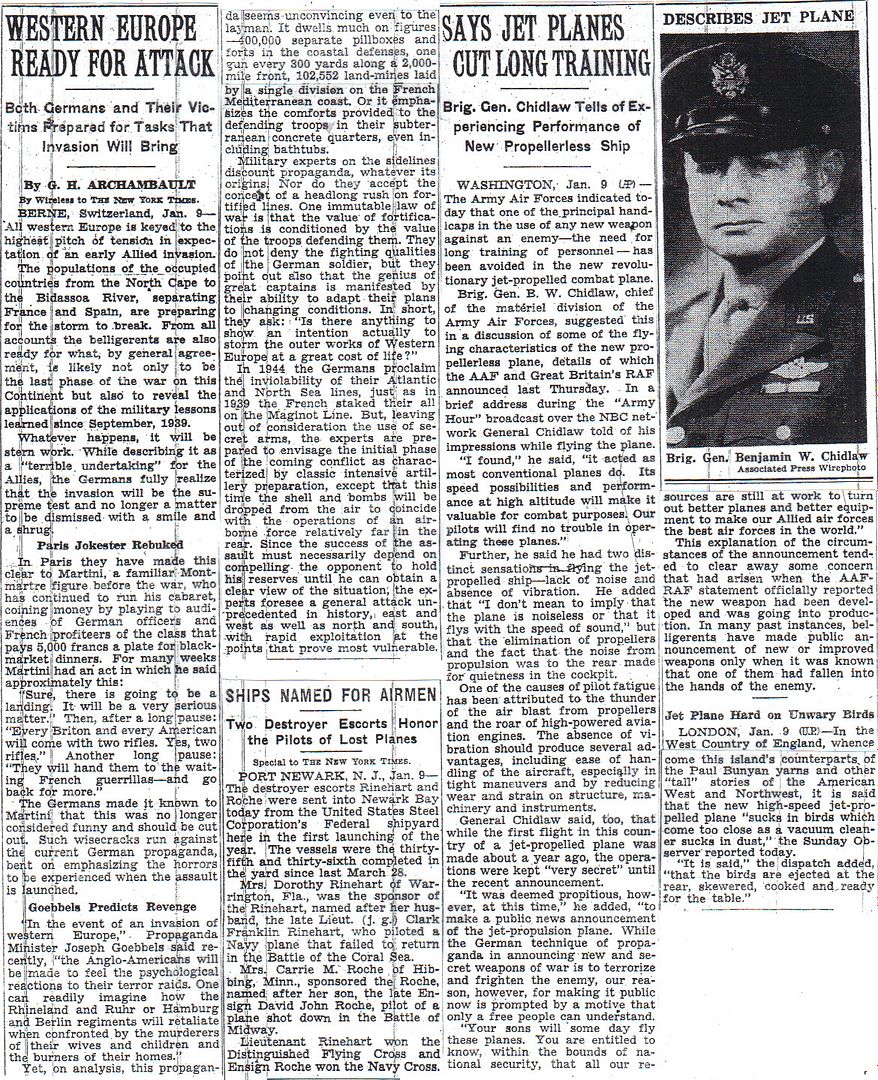
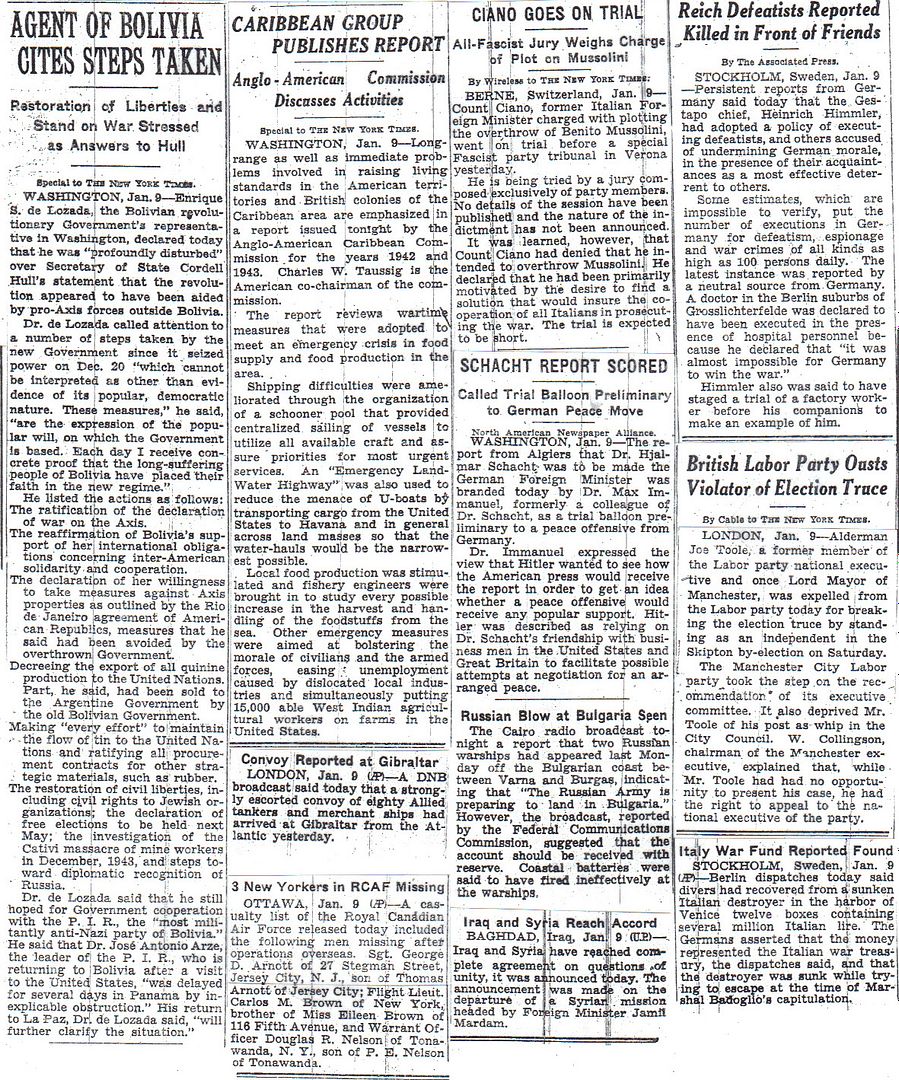
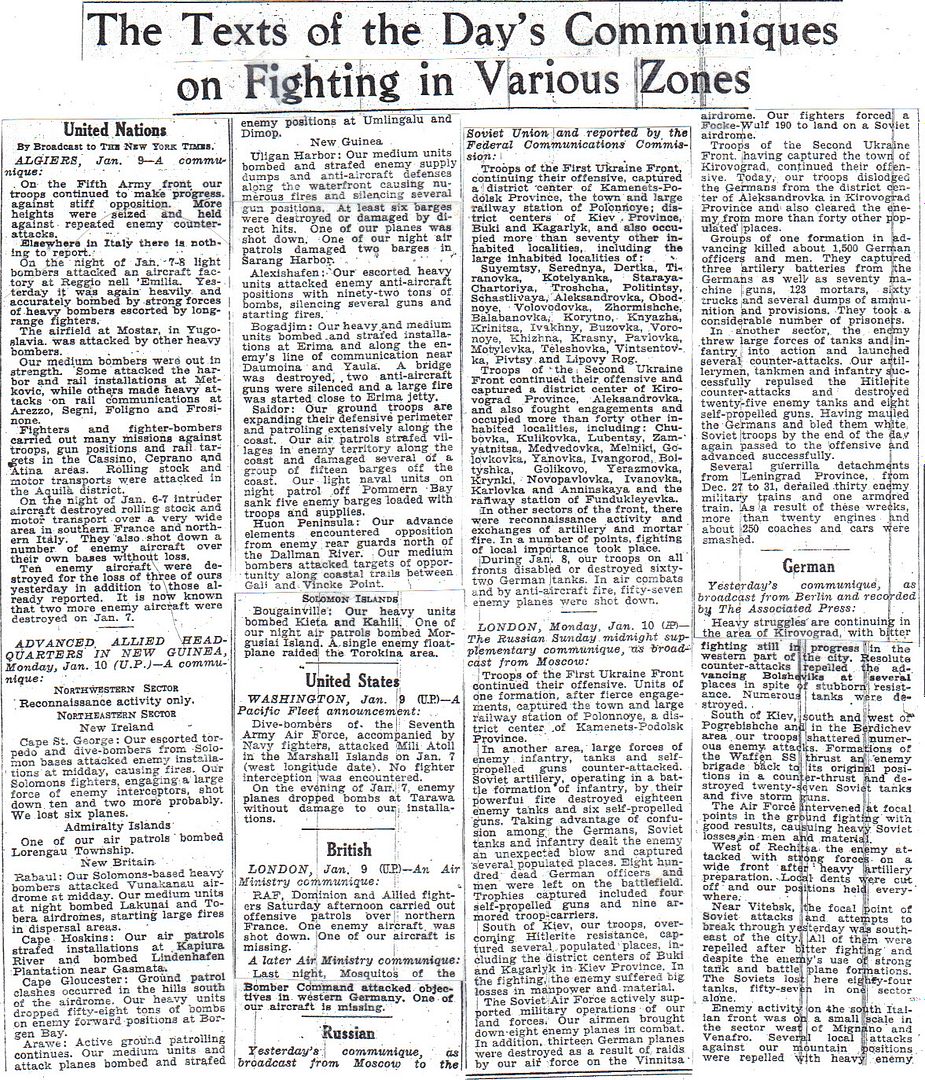
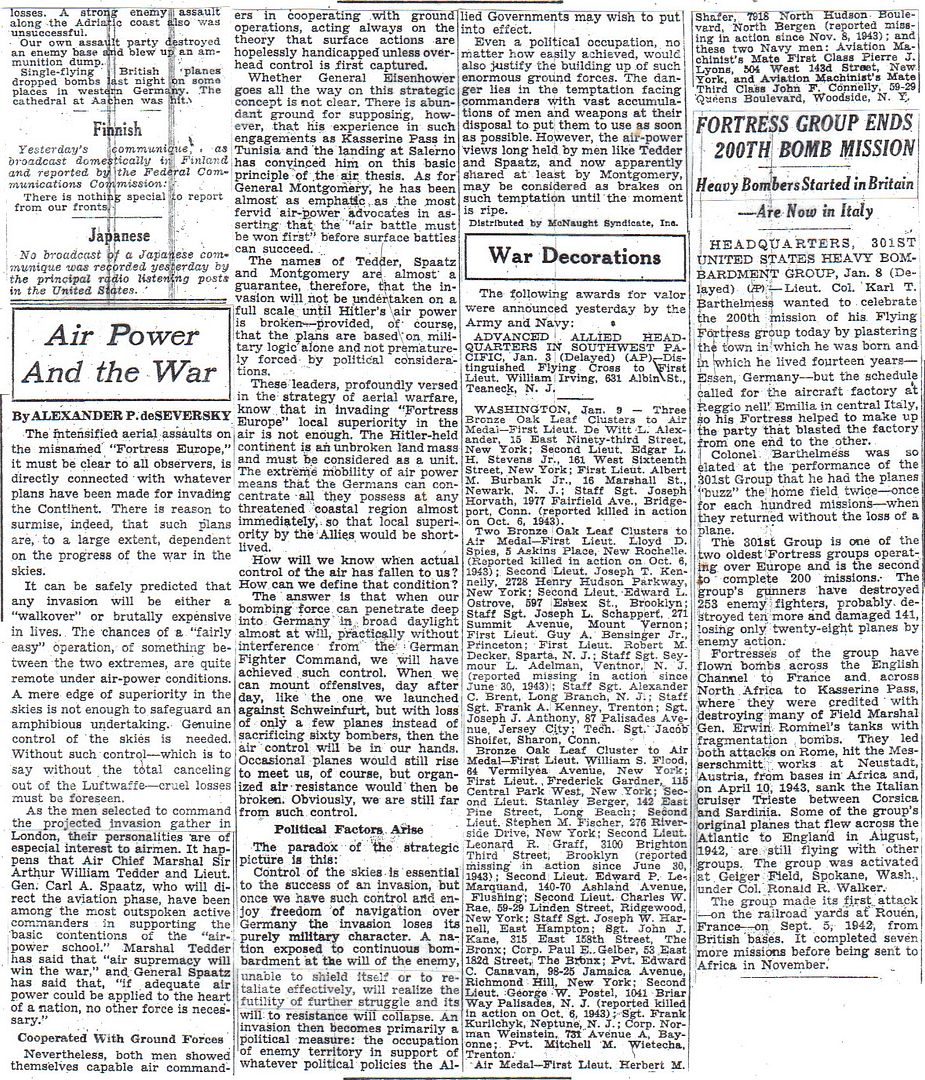
10 January. The 1st and 3d Battalion patrols inland and to the west reported no enemy contacts. A 2d Battalion patrol met some Japanese on the Sel – Seure track and requested artillery fire on them. Battery C, 121st FA Battalion, fired 60 rounds HE and 5 smoke shells. The Patrol was again stopped by an enemy machine gun still firing near some large rocks. Battery C fired another concentration, but the patrol drew still more fire and then established a position along the track for the night.
The I&R Platoon returned from patrolling inland from Cape Iris. With it came natives from villages in that district.
Major General H.W. Blakeley, USA, Ret., The 32d Infantry Division in World War II
Are you content with the situation in which the American Navy will have a good supply of fuzes, even for 4-inch guns, by the spring, whereas we shall have no such facilities during the war? I consider this point is a serious one and should be faced by the Admiralty.
2. Is there any possibility of our obtaining an allocation from the United states, or are you satisfied that our methods are good enough?
Winston S. Churchill, Closing the Ring
http://www.onwar.com/chrono/1944/jan44/f10jan44.htm
Americans reinforce New Britain
Monday, January 10, 1944 www.onwar.com
American reinforcements disembarking [photo at link]
In the Bismark Archipelago... On New Britain, Americans send reinforcements to Arawe. There is a small advance by US regimental forces along the Aogiri Ridge, despite Japanese resistance.
http://www.etherit.co.uk/month/thismonth/10.htm
January 10th, 1944 (MONDAY)
UNITED KINGDOM: No. 605 Sq. RAF shoot down their 101st enemy aircraft, a Junkers Ju 188 raiding London during the ‘little blitz’. (22)
Prime Minister Churchill”> Churchill and President Roosevelt”> Roosevelt, in a joint announcement, reported that merchant shipping losses due to U-boats were 60 percent less than losses for the preceding year.
The report of the Anglo-American Caribbean Commission was issued - A Caribbean Research Council had been set up (representing Britain, United States, and the Netherlands); steps had been taken to establish an organization for coordinating and expanding the purchase of imported food; an inter-island distribution system was developed.
Submarine HMS Sanguine laid down.
Frigate HMS Trollope commissioned.
FRANCE: Paris: The SD connive with the Milice in the murder of 84 year-old Victor Basch, formerly president of the Ligue des Droits de l’Homme, together with his 79 year-old wife.
The USAAF Eighth Air Force flies Mission 181: During the evening, five B-17 Flying Fortresses drop 4.8 million leaflets on Orleans, Chateauroux, Rouen, Le Mans and Tours without loss.
GERMANY: An announcement is made of a Swedish-German trade agreement for 1944, providing for reduction of Swedish exports to Germany.
RAF Bomber Command dispatches 40 Mosquitos to hit eight targets: eight Mosquitos bomb Berlin, three hit Solingen, two each attack Cologne, Emden, Koblenz, the Zwillingswerke Engineering Works at Solgingen and the marshalling yard at Koblenz and one bombs Krefeld.
U-1273 launched.
U-956 assisted the weather reporting ship Hessen, which was experiencing some difficulties.
NORWAY: The damaged U-277, which had gone aground and stranded in Norwegian waters, was towed free by another vessel.
BULGARIA: One hundred forty two USAAF Fifteenth Air Force B-17 Flying Fortresses bomb Sofia causing considerable damage in the marshalling yards. P-38 Lightnings and P-47 Thunderbolts provide escort. Around 60 Luftwaffe fighters attack the force and a fierce air battle ensues; one B-17 is lost; the USAAF claims 28 aircraft shot down.
During the night of 10/11 January, 42 RAF bombers of No. 205 (Heavy Bomber) Group bomb communications centers in Sofia; one aircraft is lost.
U.S.S.R.: Soviet troops cut the Smela to Kristinovka rail link, and annihilate a Nazi pocket north of Kirovgrad.
A Moscow radio broadcast a statement by the Soviet Government replying to the Polish statement of 5 January. The Soviet statement declares that the Polish assertions about the Soviet-Polish frontier are incorrect, and defends the incorporation of the territories of the western Ukraine in the Soviet Ukraine, and those of western White Russia in the Soviet White Russia. The Soviet Government does not regard the 1939 frontiers as immutable. The Soviet-Polish frontier could pass approximately along the so-called Curzon line, but Poland’s western borders must be extended to incorporate Polish land previously stolen by Germany. The Soviet Government repeats its desire for the reestablishment of a strong, independent Poland, and for friendship between Poland and the Soviet Union.
ITALY: In the U.S. Fifth Army’s II Corps area, the 34th Infantry Division’s 168th Infantry Regiment columns push toward Cervaro across hills north of the St. Vittore-Cervaro road; the 2d Battalion of the 135th Infantry Regiment, to the left, advances northwest from La Chiaia to threaten Cervaro from the south; Task Force B, on the right, heads toward Capraro Hill. The Germans strongly resists all these thrusts.
USAAF Twelfth Air Force B-25 Mitchells hit San Benedetto de Marsi; P-40s, and RAAF, RAF and SAAF aircraft hit communications, gun positions, trucks, and tanks at numerous points in and northwest of the battle area; other P-40s give close support to ground forces in the Chieti area; and A-36 Apaches hit trucks, tanks, trains, and other targets of opportunity north of Rome. During the night of 10/11 January, B-26 Marauders attack the iron and steel works at Piombino.
YUGOSLAVIA: Thirty one USAAF Fifteenth Air Force B-24 Liberators hit the marshalling yard at Skoplje. .
CHINA: Eight USAAF Fourteenth Air Force P-51 Mustangs bomb the approach to the Kienchang bridge and attack a troop train north of Teian damaging the train and killing an estimated 100 Japanese soldiers; three B-25 Mitchells and eight P-40s sweep the area from Anking to Chiuchiang, sinking a large motor launch, two 100-foot (30,5 meter) barges, and a tug on the Yangtze River, and attacking a bridge at Teian and tracks south of Chiuchiang; two B-25s and four P-40s attack shipping on the Yangtze River near Wusueh, sinking a launch and leaving three tankers burning.
BURMA: Lt-Gen William Slim’s British Fourteenth Army last night overran Maungdaw, the strategically important Burmese port on the Bay of Bengal. The victory was announced today in New Delhi by Mountbatten’s recently-established South-east Asia Command (SEAC).
Despatches from the front report that the Fourteenth Army has opened a limited offensive in the Arakan, and that the success of Maungdaw was the culmination of weeks of infiltration by British and Indian troops. Slim’s objectives are to secure the mouth of the Naf river, Maungdaw and Buthidaung before moving southwards with the ultimate aim of capturing Akyab.
The seizure of Maungdaw was preceded by heavy night artillery bombardment, followed by a ground assault by British and Indian troops. The Japanese garrison was forced to withdraw after suffering heavy casualties.
SEAC had been planning Operation Buccaneer, a major amphibious campaign to seize the Andaman Islands. But the combined chiefs of staff decided that the allocation of the assault ships and landing craft needed would jeopardize plans for the invasion of Europe and American operations in the Pacific. Admiral Mountbatten thereupon postponed Buccaneer and released nearly half of his assault shipping for Europe.
THAILAND: USAAF Tenth Air Force B-24 Liberators bomb the marshalling yard and airfield in the Bangkok area.
EAST INDIES: USAAF Fifth Air Force B-25 Mitchells bomb Koepang, Dutch Timor.
NEW GUINEA: Since a Japanese attack on Saidor, Northeast New Guinea is expected, Brigadier General Clarence Martin, Assistant Division Commander, 32nd Infantry Division, asks Lieutenant General Walter Krueger, Commanding General Sixth Army, for reinforcements and is granted Battalion Combat Teams 1 and 3 of Regimental Combat Team 128.
In Northeast New Guinea, over 100 USAAF Fifth Air Force heavy, medium, and light bombers, and fighters attack the Madang, Alexishafen, and Bogadjim areas and the coastline from Madang to Sio.
NEW BRITAIN:
The ADC Group (7th Marine Regiment reinforced by a battalion of the 5th Marine Regiment and supporting units) repels Japanese charges against Aogiri Ridge, beginning at 0115 hours, then continues their attack southward toward Hill 660. The Arawe beachhead is being reinforced.
USAAF Fifth Air Force P-39 Airacobras strafe scattered villages and barges on New Britain Island.
Ten USAAF Thirteenth Air Force B-24 Liberators bomb Vunakanau Airfield at Rabaul, New Britain Island. USMC and USN TBF Avengers and SBD Dauntlesses, escorted by USAAF and USN fighters, are prevented from attacking Lakunai Airfield at Rabaul because of bad weather but hit the lighthouse at Cape St. George on New Ireland Island.
Major General Hubert R Harmon, Commanding General USAAF Thirteenth Air Force, begins a heavy bomber campaign of night strikes tonight sending 20 B-24s on a strike against Lakunai Airfield, New Britain Island.
GILBERT ISLANDS: 392d Bombardment Squadron (Heavy) with B-24’s moved from Canton to Abemama and then to Kwajalein on 17 Mar 44.
Japanese planes again bomb the advanced base at Apamama Atoll, but inflict neither casualties nor serious damage to installations.
SOLOMON ISLANDS: Five USAAF Thirteenth Air Force B-24 Liberators hit the Kahili supply area, Bougainville Island, while four others hit the Chinatown area of Buka Island.
MARSHALL ISLANDS: Four USAAF Seventh Air Force P-39 Airacobras from Makin Island, Gilbert Islands strafe Mille Atoll; one of the P-39s drops two 500-pound (227 kilogram) bombs on the fuel storage area. During the night of 10/11 Jan,uary 16 B-24 Liberators, staging through Tarawa Atoll, Gilbert Islands from the Ellice Islands, bomb Maloelap Atoll; four others, staging through Baker Island from Canton Island, Phoenix Islands, hit Mille Atoll.
Aerial minelaying operations in the Marshalls continue: two PBY-5 Catalinas of USN Patrol Squadron Seventy Two (VP-72), flying from Tarawa, mine Meichen Channel and Legediak Strait, Wotje Atoll.
U.S.A.:
Escort carrier USS Cape Gloucester laid down
Destroyer minelayer USS Robert H Smith laid down
Destroyer escort USS Kenneth M Willett laid down
Destroyer escort USS Jack Miller launched.
Minesweeper USS defence commissioned.
Destroyer escort USS Strickland commissioned.
"In English and Hebrew, this poster urges members of the Yishuv (the Jewish community in Palestine) to join the Jewish Brigade.
From the start of the war, Jews in Palestine had joined the British Army.
But news of the mass killings fueled a desire for a separate unit, serving under a Zionist standard, to fight the Axis forces in Europe."
The Death of Captain WaskowAT THE FRONT LINES IN ITALY, January 10, 1944 – In this war I have known a lot of officers who were loved and respected by the soldiers under them. But never have I crossed the trail of any man as beloved as Capt. Henry T. Waskow of Belton, Texas.
Capt. Waskow was a company commander in the 36th Division. He had led his company since long before it left the States. He was very young, only in his middle twenties, but he carried in him a sincerity and gentleness that made people want to be guided by him.
"After my own father, he came next," a sergeant told me.
"He always looked after us," a soldier said. "He’d go to bat for us every time."
"I’ve never knowed him to do anything unfair," another one said.
I was at the foot of the mule trail the night they brought Capt. Waskow’s body down. The moon was nearly full at the time, and you could see far up the trail, and even part way across the valley below. Soldiers made shadows in the moonlight as they walked.
Dead men had been coming down the mountain all evening, lashed onto the backs of mules. They came lying belly-down across the wooden pack-saddles, their heads hanging down on the left side of the mule, their stiffened legs sticking out awkwardly from the other side, bobbing up and down as the mule walked.
The Italian mule-skinners were afraid to walk beside dead men, so Americans had to lead the mules down that night. Even the Americans were reluctant to unlash and lift off the bodies at the bottom, so an officer had to do it himself, and ask others to help.
The first one came early in the morning. They slid him down from the mule and stood him on his feet for a moment, while they got a new grip. In the half light he might have been merely a sick man standing there, leaning on the others. Then they laid him on the ground in the shadow of the low stone wall alongside the road.
I don’t know who that first one was. You feel small in the presence of dead men, and ashamed at being alive, and you don’t ask silly questions.
We left him there beside the road, that first one, and we all went back into the cowshed and sat on water cans or lay on the straw, waiting for the next batch of mules.
Somebody said the dead soldier had been dead for four days, and then nobody said anything more about it. We talked soldier talk for an hour or more. The dead man lay all alone outside in the shadow of the low stone wall.
Then a soldier came into the cowshed and said there were some more bodies outside. We went out into the road. Four mules stood there, in the moonlight, in the road where the trail came down off the mountain. The soldiers who led them stood there waiting. "This one is Captain Waskow," one of them said quietly.
Two men unlashed his body from the mule and lifted it off and laid it in the shadow beside the low stone wall. Other men took the other bodies off. Finally there were five lying end to end in a long row, alongside the road. You don’t cover up dead men in the combat zone. They just lie there in the shadows until somebody else comes after them.
The unburdened mules moved off to their olive orchard. The men in the road seemed reluctant to leave. They stood around, and gradually one by one I could sense them moving close to Capt. Waskow’s body. Not so much to look, I think, as to say something in finality to him, and to themselves. I stood close by and I could hear.
One soldier came and looked down, and he said out loud, "God damn it." That’s all he said, and then he walked away. Another one came. He said, "God damn it to hell anyway." He looked down for a few last moments, and then he turned and left.
Another man came; I think he was an officer. It was hard to tell officers from men in the half light, for all were bearded and grimy dirty. The man looked down into the dead captain’s face, and then he spoke directly to him, as though he were alive. He said: "I’m sorry, old man."
Then a soldier came and stood beside the officer, and bent over, and he too spoke to his dead captain, not in a whisper but awfully tenderly, and he said:
"I sure am sorry, sir."
Then the first man squatted down, and he reached down and took the dead hand, and he sat there for a full five minutes, holding the dead hand in his own and looking intently into the dead face, and he never uttered a sound all the time he sat there.
And finally he put the hand down, and then reached up and gently straightened the points of the captain’s shirt collar, and then he sort of rearranged the tattered edges of his uniform around the wound. And then he got up and walked away down the road in the moonlight, all alone.
After that the rest of us went back into the cowshed, leaving the five dead men lying in a line, end to end, in the shadow of the low stone wall. We lay down on the straw in the cowshed, and pretty soon we were all asleep.
Ernie Pyle Source: Ernie's War: The Best of Ernie Pyle's World War II Dispatches, edited by David Nichols, pp. 195-97. Pictures courtesy of The Lilly Library, Indiana University, Bloomington, Indiana
That is powerful. I think Robert Mitchum portrayed Captain Waskow as Captain Walker, in 1945’s “The Story of G.I. Joe,” a biopic of Ernie Pyle. We should see the review of that movie in the summer of 1945.
Page 8 has a little story about the Nazis shooting outspoken disinters. Reminds me of what some warmists are saying what they want to do to their opposition.
Former members would lend valuable assistance to the formation of the Israeli Defense Force.
This should cut down on your reading list for the ETO. Instead of tediously plowing through all those academic tomes just watch this vid and learn all about WWII in Europe in 7 minutes.
Interesting to see news releases regarding jet planes. This is the second time?
Follow up from Jan 7 article. The press is interested in this new development.
Nice. I might be able to use this.
Disclaimer: Opinions posted on Free Republic are those of the individual posters and do not necessarily represent the opinion of Free Republic or its management. All materials posted herein are protected by copyright law and the exemption for fair use of copyrighted works.